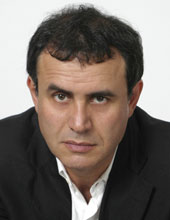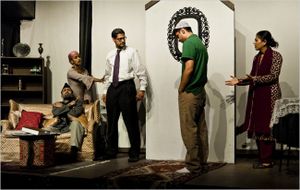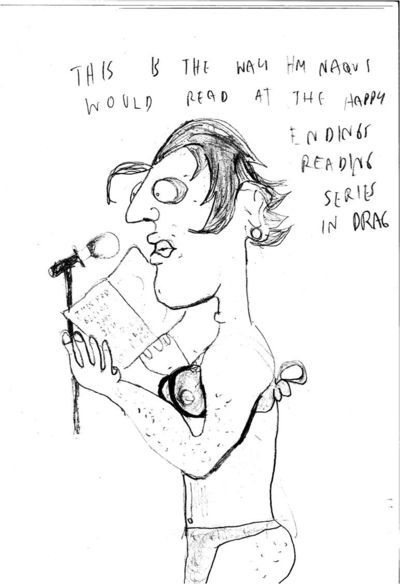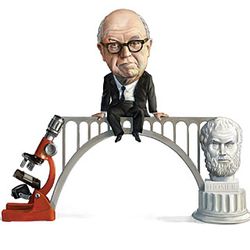 Hello,
Hello,
The editors of 3QD have made their decision. The twenty semifinalists have been winnowed down to six, plus we have added three “wildcard” entries which we thought were deserving nominees that didn't make it past the voting round. Thanks again to all the participants. There was a lot of interesting stuff, and we discovered many interesting and great blogs through this contest. I hope our readers did too.
Once again, South Tyrolean graphic artist Carla Goller has provided a “trophy” logo that our finalists may choose to display on their own blogs. And if you like our site, please do add us to your blogroll!
So, here it is, the final list that I am sending to Professor Dan Dennett, who will select the 1st, 2nd, and 3rd prize winners: (in alphabetical order by blog name)
- 3 Quarks Daily: Penne For Your Thought
- Der Wille Zur Macht und Sprachspiele: Nietzsche's Causal Essentialism
- Grundlegung: Philosophy as Bildung
- Justin Erik Halldór Smith: The Fundamentals of Gelastics
- PEA Soup: Scanlon on Moral Responsibility and Blame
- The Immanent Frame: Immanent Spirituality
- Tomkow: Blackburn, Truth and other Hot Topics
- Underverse: Refuting “It,” Thus
- Wide Scope: Emotions and Moral Skepticism
We'll announce the three winners on September 22, 2009.
Good luck!
Abbas
P.S. The editors of 3QD will not be making any comments on our deliberations, or the process by which we made our decision, other than to simply say that we picked what we thought were the best philosophy posts out of the semifinalists, and added three others that we liked.
Thursday, September 10, 2009
 In Forbes:
In Forbes:
[W]hile the rate of economic contraction is now lower than the free-fall and near-depression experienced by many economies in the fourth quarter of 2008 and the first of 2009, the recent optimism that “green shoots” of recovery will lead to the recession to bottom out by the middle of this year–and that recovery to potential growth will rapidly occur in 2010–appears grossly misplaced, for three noteworthy reasons.
First, the current deep and protracted U-shaped recession in the U.S. and other advanced economies will continue through all of 2009, rather than reach a trough in the middle of this year as expected by the optimists.
Second, rather than a rapid V-shaped recovery, growth will remain sluggish and sub-par for at least two years into all of 2010 and 2011. A couple of quarters of more rapid growth cannot be ruled out as we get out of this recession toward the end of the year or early next year as firms rebuild inventories and the effects of the monetary and fiscal stimulus reach a delayed peak. But structural weaknesses of the U.S. and the global economy will cause both a below-trend growth and even the risk of a reduction of potential growth itself.
Third, we cannot rule out a double-dip W-shaped recession, with the wings of a tentative recovery of growth in 2010 at risk of being clipped toward the end of that year or in 2011. This will result from a perfect storm of rising oil prices, rising taxes and rising nominal and real interest rates on the public debt of many advanced economies, as concerns rise about medium-term fiscal sustainability and the risk that monetization of fiscal deficits will lead to inflationary pressures after two years of deflationary pressures.

In June, 1955, Robert Frank bought a car. It was a Ford Business Coupe, five years old, sold by Ben Schultz, of New York. From there, Frank drove by himself to Detroit, where he visited the Ford River Rouge plant, in Dearborn, as if taking the coupe home to see its family. Later that summer, he headed south to Savannah, and, with the coming of fall, set off from Miami Beach to St. Petersburg, and then struck out on a long, diversionary loop to New Orleans, and thence to Houston, for a rendezvous with his wife, Mary, and their two children, Pablo and Andrea. Together, they went west, arriving in Los Angeles in the nick of Christmastime. They stayed on the Pacific Coast until May of the following year, when Mary and the children returned to New York. Frank, however, still wasn’t done. Alone again, he made the trip back, going via Reno and Salt Lake City, then pushing north on U.S. 91 to Butte, Montana. From there, it was a deep curve, though a swift one, through Wyoming, Nebraska, and Iowa to Chicago, where he turned south; at last, by early June, Frank and his Ford Business, his partner for ten thousand miles, were back in New York. It had been a year, more or less, since he embarked, and there was much to reflect upon. Luckily, he’d taken a few photographs along the way.
more from Anthony Lane at The New Yorker here.

Sometime around 1537, Petrus Gonzales was born on Tenerife with a rare genetic disorder that made hair grow all over his face and across his body. He was recognized as one of the “wild” or “dog-faced” men believed to exist at the outer reaches of the world, and was sent as a curiosity to the French court of Henry II and Catherine de’ Medici. There, he was raised as a courtier, married a smooth-faced woman and had at least seven children with her. Most of them shared his furriness and also became minor court celebrities, but eventually settled together in an Italian village and fell from historical record. Merry Wiesner-Hanks in The Marvelous Hairy Girls has now carefully reconstructed the story of the Gonzales family, and especially of the three hairy daughters, Maddalena, Francesca and Antonietta. Although the sources are sparse, they include evocative paintings and medical records; and Wiesner-Hanks makes the most of them by sensitively drawing out the attitudes behind the artistic, religious and scientific interest in the hairy family.
more from Bettina Bildhauer at the TLS here.

It is not a new thought that the Belgian painter James Ensor—who was born in 1860 and died in 1949—was bewitched by the shimmering, iridescent light of his native Ostend, the resort on the North Sea. The artist himself rhapsodically described his hometown’s pearly and rarely directly sunny light and marine air. At the Museum of Modern Art’s current Ensor retrospective, though, the significance of an atmosphere where light is always indirect, skies seem invariably cloudy and possibly rain-filled, and shadows therefore are rarely densely dark came through with a new force. It was Ensor’s affinity for this whitened, moist, and fleeting atmosphere, one could believe, that lies behind what is most appealing and distinctive about his paintings, drawings, and prints as objects: their often powdery, shifting surfaces and the way his forms—whether he is showing a group of carnival revelers in masks, the roofs of Ostend under a huge sky, or crowds pouring forth on a street—look as if they have only this moment come together (and will in another second move apart).
more from Sanford Schwartz at the NYRB here (my own take on Ensor here).
Omens
Cows always take the easiest path
Dead level to suit their ambling shuffle
Which was why the builders of the first
American roads took the ancient buffalo routes.
Foxes are different though, they blaze
A vertical trail over ditches,
Scatter decoys in your wake to spoil the chase.
Badgers are erratic, will disperse wodges of earth
Any old how and leave no directive
To chart the route to their winter burrow.
Above though, the November flocks impress
Carve a V and tell you exactly where they are headed.
So why should I still look out for omens
When I can track to a T the path my brother
Took across these fields before he left us,
And worry about what signposts I can turn to
To chart my progress when I’ve exhausted
All the pathways of earth and sky.
by Eugene O’Connell
from One Clear Call; Bradshaw Books, Cork, 2003
From The Washington Post:
 Anita Diamant's new novel offers all the satisfactions found in her previous works “The Red Tent” and “The Last Days of Dogtown”: rich portraits of female friendship, unflinching acknowledgment of life's cruelty and resolute assertion of hope, enfolded in a strong story line developed in lucid prose. She ups the ante here, chronicling three months in the lives of Jewish refugees interned in Atlit, a British detention center for illegal immigrants to the Palestinian Mandate. Based on an actual event — the rescue of more than 200 detainees from Atlit in October 1945 — “Day After Night” demonstrates the power of fiction to illuminate the souls of people battered by the forces of history.
Anita Diamant's new novel offers all the satisfactions found in her previous works “The Red Tent” and “The Last Days of Dogtown”: rich portraits of female friendship, unflinching acknowledgment of life's cruelty and resolute assertion of hope, enfolded in a strong story line developed in lucid prose. She ups the ante here, chronicling three months in the lives of Jewish refugees interned in Atlit, a British detention center for illegal immigrants to the Palestinian Mandate. Based on an actual event — the rescue of more than 200 detainees from Atlit in October 1945 — “Day After Night” demonstrates the power of fiction to illuminate the souls of people battered by the forces of history.
“Not one of the women in Barrack C is twenty-one, but all of them are orphans,” the author tells us on the first page. “There are only 170 prisoners in Atlit tonight, and fewer than seventy women in all. It is the same lopsided ratio on the chaotic roads of Poland and Germany, France and Italy; the same in the train stations and the Displaced Persons camps.” Tedi, Zorah, Shayndel and Leonie have lost their parents in the Holocaust and are the random survivors of Nazi genocide that killed women faster than men because they had less short-term value as slave labor. Only Zorah was in a concentration camp; Tedi was hidden in the Dutch countryside; Shayndel, a Polish Zionist, fought with the partisans; Leonie was forced into prostitution in Paris. But each of these women wonders why she was spared when so many others died.
More here.
From The New Yorker:
 Before President Obama’s speech on health care, I wrote out a list of what I thought we needed him to do.
Before President Obama’s speech on health care, I wrote out a list of what I thought we needed him to do.
- Make clear the stakes.
- Make clear what we get under his reform.
- Understand our fears.
- Convey strength in the face of them.
- Speak to our core beliefs as a nation.
I thought he did this and did it amply. He made clear that our present system is damaging our people and damaging our economy. He made clear that if we accepted the challenge and the struggle, we could have better insurance coverage without preëxisting condition exclusions or sudden disappearance of benefits. Those of us who are self-employed or unable to get coverage through work could have the kinds of insurance choices and discounts that big companies and congressmen can get. Those who don’t have the money for this coverage could get tax credits to offset the costs. The elderly would get a better drug-benefit package.
There was nothing here that was watered down or unfamiliar, either. He did not skirt the realities that this would have to be paid for—that government would be requiring many businesses to cover their employees and most individuals to carry insurance coverage, and that he would be using money from ending subsidies to Medicare HMOs to help finance the bill. And he spoke with podium-pounding conviction in response to the absurd charges that this would involve government takeover of our doctor’s offices and to the deeper fears that those charges fed into.
After far too many weeks, he again became the Barack Obama one could rally behind—the cool-headed president willing to face long odds and enemy fire, rather than the coolly calculating professor with the academic’s annoying certitude.
As I said, he checked all the boxes on my list. And yet I remain concerned that he may not have done enough.
More here.
From The New York Times:
 For Khulsoom and Salman, hard-working immigrant Muslims from Pakistan, life in the American suburbs in the post- 9/11 era is not working out the way they had planned. Their oldest son is an unmarried playboy, and their daughter has become a student activist who wears a head scarf as a sign of her newfound religious fervor and is dating a devoted Muslim who happens to be an African-American. And now their younger son, the good, obedient son, comes home on a college break and announces that he is abandoning premed courses to become a history teacher so that he can help correct the misinformation being spread about Islam.
For Khulsoom and Salman, hard-working immigrant Muslims from Pakistan, life in the American suburbs in the post- 9/11 era is not working out the way they had planned. Their oldest son is an unmarried playboy, and their daughter has become a student activist who wears a head scarf as a sign of her newfound religious fervor and is dating a devoted Muslim who happens to be an African-American. And now their younger son, the good, obedient son, comes home on a college break and announces that he is abandoning premed courses to become a history teacher so that he can help correct the misinformation being spread about Islam.
“You will get the blessings of my work,” the younger son tells his parents.
“We have enough blessings,” his mother says. “You can bless us by becoming a surgeon. You like kids? Become a pediatrician. Teach them Islam as you give them their lollipops.”
This family is at the center of “The Domestic Crusaders,” an envelope-pushing play that opens on 9/11 at the Nuyorican Poets Cafe and runs for the next five weekends. When the family reunites for the younger son’s birthday, conflicts erupt over everything from biryani to sex roles to Middle Eastern politics to airport security checks to racism. The play was written by Wajahat Ali, a young Pakistani-American who grew up in Fremont, Calif. He started writing it in the weeks after the terrorist attacks as a paper for a college class taught by the poet and playwright Ishmael Reed. The actors, all South Asians, are playing roles that echo their own lives. Some will be performing while they are fasting for Ramadan.
More here.
Ananya Vajpeyi reads Wendy Doniger’s capacious study of the diversity of Hindu tales and traditions, which serves as a riposte to the self-appointed guardians of Indian culture by celebrating the multiple varieties of Hindu religious experience.
From The National:
 From ancient times men have dominated the world of Sanskrit scholarship. Originally those men were Brahmins; then they became Europeans, then Englishmen, and finally Indians. It is only in the past 50 years or so that women have begun to enter this esoteric field of study, and in this regard, Wendy Doniger has been a pioneer and a force to reckon with. Her new book, The Hindus: An Alternative History brings 30 years of her rigorous and innovative scholarly practice to a fitting climax – and I use the word advisedly. Doniger has studied Hinduism in its erotic, aesthetic and corporeal aspects, making her the target of envy as well as criticism from her colleagues. Her work, which includes a translation of the Kamasutra and extensive writing on Shiva, the Hindu god of cosmic destruction, who is worshipped in the form of a phallus (linga), is often seen to be titillating. She is interested in asceticism, but also in sexuality; in the spiritual, but also in the carnal.
From ancient times men have dominated the world of Sanskrit scholarship. Originally those men were Brahmins; then they became Europeans, then Englishmen, and finally Indians. It is only in the past 50 years or so that women have begun to enter this esoteric field of study, and in this regard, Wendy Doniger has been a pioneer and a force to reckon with. Her new book, The Hindus: An Alternative History brings 30 years of her rigorous and innovative scholarly practice to a fitting climax – and I use the word advisedly. Doniger has studied Hinduism in its erotic, aesthetic and corporeal aspects, making her the target of envy as well as criticism from her colleagues. Her work, which includes a translation of the Kamasutra and extensive writing on Shiva, the Hindu god of cosmic destruction, who is worshipped in the form of a phallus (linga), is often seen to be titillating. She is interested in asceticism, but also in sexuality; in the spiritual, but also in the carnal.
Hindu traditions are diverse and heterodox enough to incorporate a number of parallel doctrines, theologies and belief systems, as well as an enormous repertoire of deities, symbols, rituals and concepts that contradict one another and yet coexist. Doniger’s openness to the varieties of religious experience permitted under the accommodating and multifarious rubric of Hinduism has upset all manner of people, from devout Hindus, to the votaries of Hindu nationalism (“Hindutva”), from American professors to German philologists. Nearly all of them misunderstand her work, particularly her creative ways of exploring how Hindu thought connects mind, body and soul, rather than placing them in conflict with each other.
More here. [Thanks to Namit Arora.]
Wednesday, September 9, 2009
David G. Victor and Richard K. Morse in the Boston Review:
 All fossil fuels emit carbon dioxide when burned, but the real heart of the warming problem is coal. Emissions from coal are growing faster than from any other fossil fuel. Beyond greenhouse-gas pollution, coal is linked to a host of other environmental troubles such as local air pollution, which is why a powerful coalition of environmentalists in the richest and greenest countries is rallying to stop coal. Mired in opposition, barely any new coal plants are being built anywhere in the industrialized world. Coal, it may seem, is on the precipice.
All fossil fuels emit carbon dioxide when burned, but the real heart of the warming problem is coal. Emissions from coal are growing faster than from any other fossil fuel. Beyond greenhouse-gas pollution, coal is linked to a host of other environmental troubles such as local air pollution, which is why a powerful coalition of environmentalists in the richest and greenest countries is rallying to stop coal. Mired in opposition, barely any new coal plants are being built anywhere in the industrialized world. Coal, it may seem, is on the precipice.
Yet coal remains indispensable. No other fuel matches its promise of cheap and abundant energy for development. About half the electricity in the United States comes from burning coal. Germany, the anchor of old Europe’s economy, is a coal country. Poland, the heart of new Europe, gets 90 percent of its electricity from coal. The fast-growing economies of Asia, in particular China and India, are all coal-fired. Indeed, while the outlook for coal consumption in the industrialized world is flat, soaring Asian growth is expected nearly to double world consumption by 2030.
The central task of any serious (and politically viable) global-warming policy, then, is to reconcile these diverging patterns.
More here.
Amanda Stern in Lessons in Curating. Lessons in Culture:

I asked the author,
Akhil Sharma to conduct a
One Word Celebrity Interview with
Husain Naqvi (author of
Home Boy). Granted, Husain cheats a little, stretching out those one words, but we'll cut him some slack because he's nice and wrote a good book.
(1) Your book is about the adventures and misadventures of several young Pakistani men. They basically want to drink and get laid and they come into conflict with their elders and also with the US government, both of whom have pre-conceived ideas of what it means to be a young Pakistani male. Did the plot, which has the feel of a picaresque adventure, come about as a result of these young men being shoved by these forces with their preconceived ideas?
A: Yes.
…
(11) Did you begin writing the novel with the idea that you were writing a novel or was it a short story that got longer and longer?
A: Slam (poem).
(12) You wrote this book in Cambridge, a town of tremendous affluence, while you and wife lived in a single room on very little money. How did you manage to slog through the years that it took to write the book?
A: Pasta, Ativan.
(13) You have now been living in Karachi for a little over a year and expect to be there for another year or so. Your book, in many ways, feels very American, young immigrants rejecting the ways of the “old country”. Has your conception of your book changed since you moved back to Karachi? Have certain colors in the book dimmed to your eyes and others brightened?
A: Brightened…

Even before the elections last November, particularly astute conservatives had lamented that many of the supposed victories for their cause were in truth nothing to celebrate. Most of these persons were paleo- or traditional conservatives, who saw in the Bush administration little that was genuinely conservative and much that testified to the further usurpation of the word “conservative,” and of the Republican Party by a neoconservative agenda. That agenda was largely repugnant to those who believed in local and limited government founded on enduring cultural traditions, stable and self-sustaining communities, and, above all, the Christian intellectual legacy which informs all things by means of faith and reason. They, naturally, saw even less to admire in the candidacy of John McCain. But the traditional and neo-conservative animus was not then and is not now reducible to competing definitions of “conservative” or even to competing public policy platforms. When, at the 1992 Republican National Convention, Patrick Buchanan, that arch paleo-conservative, railed that America was locked in a culture war, his observation was perspicuous but generally understood in unhelpful ways. The media and even most admirers of Buchanan drew the lines in that war between an abstract conservative theory of culture on the one hand and those who “manufacture” culture in our society, the culture industry mostly located in Hollywood and New York. As such, the culture war appeared to be little more than disgruntlement of the heartland against the coasts, of consumers against retailers, of passive recipients against makers, or, at best, armchair theorists against commercially successful practitioners, the categories of whose success went undisputed.
more from James Matthew Wilson at First Principles here.

There is a familiar story about a sad and lonely man filling up an entire house with bric-a-brac until he is obliged to crawl about inside it like a mole, searching for an unfilled corner. Collecting can develop into a disease. Grander collections demand endless money to feed the infection, but the symptoms are similar: an inability to throw anything away, a reluctance to organise what has already been bought in the mad drive to collect still more, and a pathological secretiveness. Henry Wellcome, renowned philanthropist and founder of a pharmaceutical empire, filled whole warehouses with crates of his purchases. Every crate was packed in turn with numerous objects – hundreds of pestles and mortars, dozens of spears, pillboxes, jujus, naïve paintings, African masks, stone tools. He wanted to collect the entire history of mankind. It all started modestly enough. The history of medicine was a neglected topic at the end of the nineteenth century. Inspired by the contemporary burgeoning of natural history and anthropological museums, Wellcome wished to create an exhibition laying out the story of medical treatment through the objects of the trade. The Wellcome Historical Medical Museum eventually opened in June 1913 in Wigmore Street, to general acclaim.
more from Richard Fortey at Literary Review here.

While compiling images for a guidebook to invertebrates and their tracks, Western Massachusetts-based biologist Noah Charney began entertaining an unscientific notion. Looking at the complicated patterns created by bees as they excised circular patches from leaves, the delicate arrangement of tiny hatchmarks made by a slug chewing its way across an algae-covered branch, or the radiating paths marking the progress of beetles through the bark of a fallen log, he made an observation: it looked like the bugs were making art. We’re often helpless (even those of us, like Charney, with a master’s degree in biology) against a tendency to anthropomorphize nature: we’re forever seeing rock formations that look like faces, or animal behaviors that remind us of our own. Suspending his disbelief, Charney put together an online gallery of photos devoted to the question of invertebrate aesthetics. The question was, if insects are artists, what kind of artists are they?
more from Roger White at the Boston Globe here.
From The Guardian:
 If Thomas Henry Huxley was famously “Darwin's bulldog”, then Richard Dawkins is probably best described as “Darwin's pit bull”. He gets his teeth into an argument, locks on and shakes it until submission is the only option. There's a certain glee when he admits to being “the devil's disciple” or the high priest of “ultradarwinism”, and his admission has an undeniably macho swagger about it. Real men (and women) take the toughest line on natural selection. Suffering and pain in nature and humanity are merely there to service the genes. Anything else is “Sentimental, human nonsense. Natural selection is all futile.” There is something bracing about belonging to this most astringent and clear-sighted set. Deluded theists! Wishy-washy agnostics! Welcome to the Fight Club. One is reminded of lines by Dawkins's favourite poet, WB Yeats: “Cast a cold eye / On life, on death. / Horseman, pass by.”
If Thomas Henry Huxley was famously “Darwin's bulldog”, then Richard Dawkins is probably best described as “Darwin's pit bull”. He gets his teeth into an argument, locks on and shakes it until submission is the only option. There's a certain glee when he admits to being “the devil's disciple” or the high priest of “ultradarwinism”, and his admission has an undeniably macho swagger about it. Real men (and women) take the toughest line on natural selection. Suffering and pain in nature and humanity are merely there to service the genes. Anything else is “Sentimental, human nonsense. Natural selection is all futile.” There is something bracing about belonging to this most astringent and clear-sighted set. Deluded theists! Wishy-washy agnostics! Welcome to the Fight Club. One is reminded of lines by Dawkins's favourite poet, WB Yeats: “Cast a cold eye / On life, on death. / Horseman, pass by.”
The greatest story is, of course, the story of evolution. This latest addition to the Dawkins canon is his summary of the vast array of evidence supporting the science. Palaeontology, embryology, anatomy, genetics, artificial breeding and geography are all grist to his evolutionary mill. Dawkins's writing demonstrates once again his consummate skill as an explainer. He never makes assumptions about prior knowledge; when he chooses an analogy it does actually cast light on the thing to be explained (some scientists seem to find this extraordinarily difficult); and occasionally he coins a brilliant phrase. Those who have already climbed Mount Improbable with him or contemplated the blind watchmaker will not be disappointed, even though some of the same ground has been re-ploughed for a new crop.
More here.
From Scientific American:
 Earlier this summer marked the 50th anniversary of C. P. Snow’s famous “Two Cultures” essay, in which he lamented the great cultural divide that separates two great areas of human intellectual activity, “science” and “the arts.” Snow argued that practitioners in both areas should build bridges, to further the progress of human knowledge and to benefit society.
Earlier this summer marked the 50th anniversary of C. P. Snow’s famous “Two Cultures” essay, in which he lamented the great cultural divide that separates two great areas of human intellectual activity, “science” and “the arts.” Snow argued that practitioners in both areas should build bridges, to further the progress of human knowledge and to benefit society.
Alas, Snow’s vision has gone unrealized. Instead literary agent John Brockman has posited a “third culture,” of scientists who communicate directly with the public about their work in media such as books without the intervening assistance of literary types. At the same time, many of those in the humanities, arts and politics remain content living within the walls of scientific illiteracy.
More here.
Phil Plait on Barack Obama's speech to schoolchildren yesterday, in Bad Astronomy:
 Seriously, read this whole speech. It’s inspiring, wonderful, and designed to inspire kids to stay in school, accept the responsibility of the education, learn things, and then go and and do good for the world.
Seriously, read this whole speech. It’s inspiring, wonderful, and designed to inspire kids to stay in school, accept the responsibility of the education, learn things, and then go and and do good for the world.
Of course, there is a lunatic fringe in this country who will go ballistic about Obama no matter what he does; these are the ones saying the speech is indoctrinating children into accepting his socialist health care plan that will mutilate puppies and convert our elderly into Soylent Green. These people may be rabid racists, or simply mentally unbalanced, but we know for a rock solid fact that these people are utterly, completely wrong. Whatever you want to call them, it’s clear they are so far from the norm of the American people that they can’t even see the horizon from where they are. Simply reading the speech transcript shows that simply and clearly. But it’s also a fact that this subset of the population will always be with us.
But you know what? That doesn’t mean we have to give them a voice in the mainstream press. They have a right to their speech, but that doesn’t obligate anyone to pay attention to them, especially on the platform of national TV. I’m looking you right in the eye, Fox News. Not only do you give these people — factually wrong and provably so — a voice, you reiterate their comments and use your own voice to back them up.
This sort of thing mainstreams a view that is charitably called crazy. Again, I urge you to read Obama’s actual speech. It’s awesome, and something every kid should see and hear.
More here.
